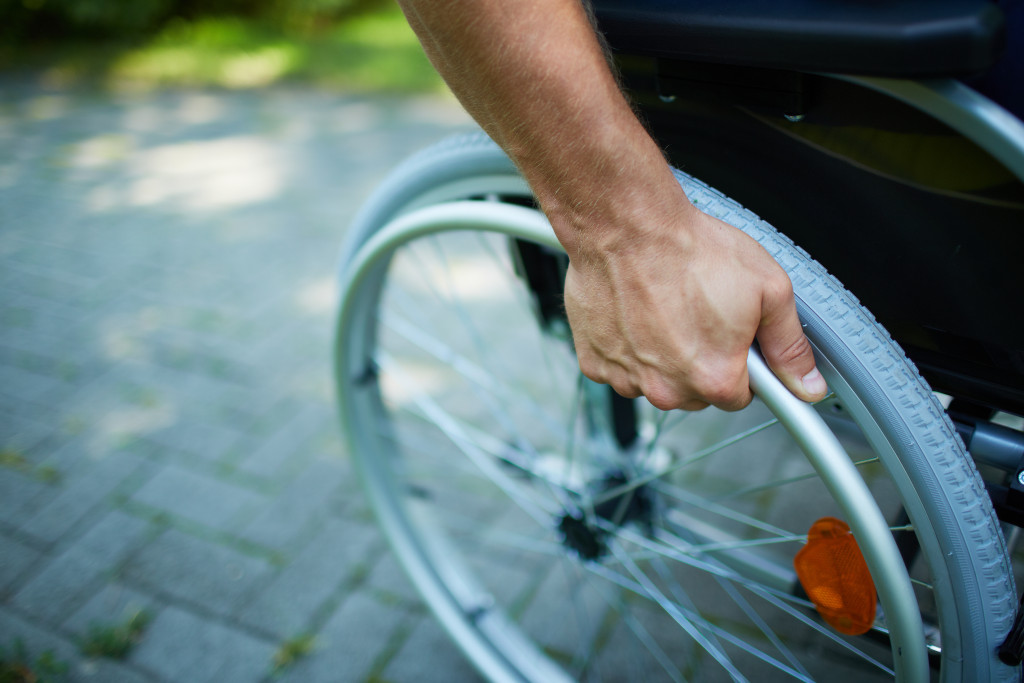- Promote accessibility in your community to create an inclusive environment for people with disabilities.
- Offer practical assistance such as respectful help, errand/transportation, and housework/maintenance.
- Be respectful and inclusive in language and interactions regarding individuals with disabilities.
- Support disability rights and advocacy efforts in your community.
- Encourage disability insurance claims to provide individuals with disabilities access to resources and support.
As a member of your community, you have the power to impact the lives of people with disabilities positively. Being inclusive and supportive can help create a more accessible and inclusive environment for individuals with disabilities to thrive. This guide will discuss five tips to help the disabled in your community, from advocating for their rights to providing practical support and encouragement.
1. Promote Accessibility In Your Community
Accessibility is a crucial aspect of inclusivity for people with disabilities. You can help promote accessibility in your community by advocating for wheelchair ramps, accessible parking spaces, and other accommodations in public spaces. You can also raise awareness about the importance of accessibility among local businesses and organizations and encourage them to make their facilities and services more inclusive. This may involve contacting local government officials, attending community meetings, or collaborating with disability advocacy groups.
Another way to promote accessibility is to make your home and property accessible. Consider installing grab bars in bathrooms, widening doorways for wheelchair users, and ensuring pathways are clear and free from obstacles. Creating an inclusive environment in your own space can set an example for others in your community to follow.
2. Offer Practical Assistance
Practical assistance can go a long way in helping individuals with disabilities in your community. By doing so, you can ensure they have access to resources, assistance and advocacy. Your assistance can make a big difference in their quality of life and allow them to participate in activities they may not have been able to do independently.
Here's how you can offer practical assistance:
Respectful Assistance
It is important always to respect the autonomy of individuals with disabilities when offering assistance. Ask for permission before providing help, and be mindful that some individuals may prefer to do things independently. A good way to gauge whether someone needs assistance is by asking, “Can I help you with anything?” If they decline, accept their decision and move on.
Errands and Transportation

Offering to run errands or provide transportation can be a great way to assist an individual with a disability in your community. This could include taking them shopping, helping carry groceries, or driving them to appointments or events they would otherwise have difficulty attending due to limited mobility or access issues.
Housework and Maintenance
Doing small household tasks or maintenance can make a big difference in the lives of people with disabilities. This could include mowing the lawn, raking leaves, cleaning dishes, doing laundry, or helping repair broken items around the house.
Simple Acts of Kindness
Even little acts of kindness can go a long way for individuals with disabilities. Open doors for them, offer to carry things they are struggling with, ask if they need help crossing busy intersections — these simple gestures can put a smile on someone's face and make their day just a bit easier.
3. Be Inclusive and Respectful in your Language and Interactions
Language and communication are important aspects of inclusivity. Using respectful and inclusive language is essential when referring to individuals with disabilities. Avoid using derogatory terms or making assumptions about someone's abilities or limitations. It's always best to ask individuals how they prefer to be referred to and use person-first language, emphasizing the person rather than their disability.
When interacting with individuals with disabilities, be patient, understanding, and respectful. Avoid making assumptions or patronizing gestures, and instead, listen actively and treat individuals with the same level of dignity and respect that you would offer to anyone else. Be mindful of different communication styles and assistive devices that individuals may use, and be willing to adapt your communication to meet their needs.
4. Support Disability Rights and Advocacy

Advocacy is a powerful tool in promoting the rights and inclusion of individuals with disabilities. Get involved in local disability advocacy groups, attend events and rallies, and support disability rights initiatives in your community. Educate yourself and others about disability rights, laws, and policies, and be an ally by speaking up against discrimination, injustice, and inequality. By actively supporting disability rights and advocacy efforts, you can help create a more inclusive and equitable community for individuals with disabilities.
5. Encourage Disability Insurance Claims
Access to the right resources and support can make a difference for individuals with disabilities. Encourage your community to utilize disability insurance claims to access the support and services they need. Disability insurance provides financial security for individuals unable to work due to a disability and compensation for medical expenses and other related costs. Individuals in your community must know about their rights and have access to the resources they need, so encourage them to use disability insurance claims if available.
In Closing
As a member of your community, you have the power to make a meaningful difference in the lives of individuals with disabilities. By promoting accessibility, offering practical assistance, being inclusive in your language and interactions, supporting disability rights, and encouraging insurance claims, you can help create an environment that supports and celebrates the unique abilities of individuals with disabilities.





